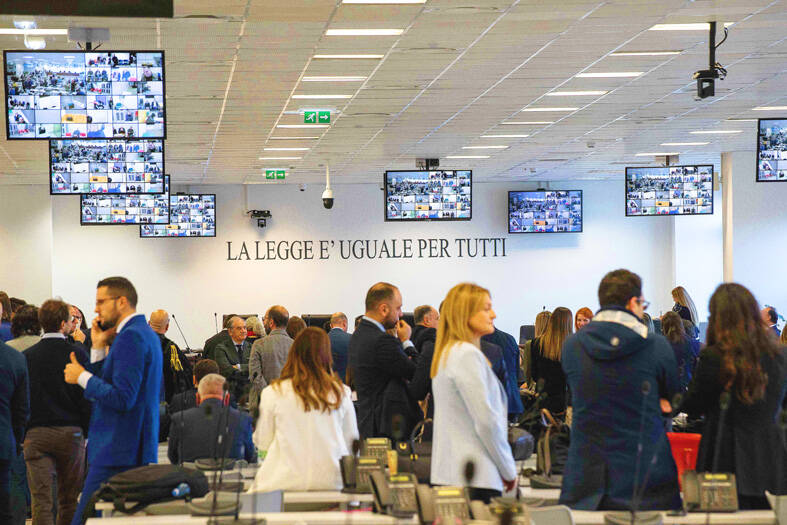An Italian court on Monday convicted more than 200 mobsters and their white-collar helpers, the culmination of a historic, nearly three-year trial against Calabria’s notorious ’Ndrangheta mafia.
For more than an hour and a half, Brigida Cavasino, president of the court in southern Vibo Valentia, steadily read out the names of the guilty and their sentences, which ranged from 30 years to a few months, as defendants incarcerated in prisons across the nation watched via videolink.
Prosecutors had asked for sentences totaling nearly 5,000 years for 322 accused mafia members operating in the Calabrian province of Vibo Valentia and their collaborators who have exercised a virtual stranglehold over the local population.

Photo: AFP
However, after a trial that lasted two years and nine months, the court doled out under half that total time, about 2,150 years collectively, with the convictions of 207 defendants. That included four seasoned members of the ’Ndrangheta each sentenced to three decades in jail.
The three-judge panel acquitted 131 defendants, including one whom prosecutors said controlled mafia activities within the prison and another accused of helping commandeer a public road and adjoining private land to use for grazing sheep.
Underscoring the ’Ndrangheta’s close ties with the powerful, one of the trial’s most high-profile defendants was 70-year-old former parliamentarian and defense lawyer Giancarlo Pittelli, accused of being a fixer for the mafia. He received 11 years, short of the 17 years prosecutors had requested.
A few dozen family members sat in the back of the vast, narrow courtroom, squinting at the television screens for a glimpse of their loved ones in prison, and occasionally crying out with joy over a light sentence.
The verdicts — which can be appealed twice — capped Italy’s largest mafia trial in decades and, despite Monday’s acquittals, mark the most significant blow to date against one of the world’s most powerful organized crime syndicates.
Giuseppe Borrello, the local representative for anti-mafia association Libera, said the verdicts showed that prosecutors’ efforts were working, even if they fell short for all suspects.
“The road is still long, but it’s been charted out, that’s the most important thing,” Borrello said.
“The strong message it [the collective verdict] sends is that the sense of impunity that has very often been felt in our territory is gone,” he said.
The ’Ndrangheta has flourished beyond its roots in the poor region of Calabria, at the toe of Italy’s boot, to exercise a near-monopoly on the European cocaine trade, and is now found in more than 40 countries worldwide.
Since the trial began in January 2021, the court has heard thousands of hours of testimony, including from more than 50 former mafia operatives turned state witnesses, detailing countless examples of the ’Ndrangheta’s brutality and its iron grip on the territory.

DEFENDING DEMOCRACY: Taiwan shares the same values as those that fought in WWII, and nations must unite to halt the expansion of a new authoritarian bloc, Lai said The government yesterday held a commemoration ceremony for Victory in Europe (V-E) Day, joining the rest of the world for the first time to mark the anniversary of the end of World War II in Europe. Taiwan honoring V-E Day signifies “our growing connections with the international community,” President William Lai (賴清德) said at a reception in Taipei on the 80th anniversary of V-E Day. One of the major lessons of World War II is that “authoritarianism and aggression lead only to slaughter, tragedy and greater inequality,” Lai said. Even more importantly, the war also taught people that “those who cherish peace cannot

STEADFAST FRIEND: The bills encourage increased Taiwan-US engagement and address China’s distortion of UN Resolution 2758 to isolate Taiwan internationally The Presidential Office yesterday thanked the US House of Representatives for unanimously passing two Taiwan-related bills highlighting its solid support for Taiwan’s democracy and global participation, and for deepening bilateral relations. One of the bills, the Taiwan Assurance Implementation Act, requires the US Department of State to periodically review its guidelines for engagement with Taiwan, and report to the US Congress on the guidelines and plans to lift self-imposed limitations on US-Taiwan engagement. The other bill is the Taiwan International Solidarity Act, which clarifies that UN Resolution 2758 does not address the issue of the representation of Taiwan or its people in

US Indo-Pacific Commander Admiral Samuel Paparo on Friday expressed concern over the rate at which China is diversifying its military exercises, the Financial Times (FT) reported on Saturday. “The rates of change on the depth and breadth of their exercises is the one non-linear effect that I’ve seen in the last year that wakes me up at night or keeps me up at night,” Paparo was quoted by FT as saying while attending the annual Sedona Forum at the McCain Institute in Arizona. Paparo also expressed concern over the speed with which China was expanding its military. While the US

‘FALLACY’: Xi’s assertions that Taiwan was given to the PRC after WWII confused right and wrong, and were contrary to the facts, the Ministry of Foreign Affairs said The Ministry of Foreign Affairs yesterday called Chinese President Xi Jinping’s (習近平) claim that China historically has sovereignty over Taiwan “deceptive” and “contrary to the facts.” In an article published on Wednesday in the Russian state-run Rossiyskaya Gazeta, Xi said that this year not only marks 80 years since the end of World War II and the founding of the UN, but also “Taiwan’s restoration to China.” “A series of instruments with legal effect under international law, including the Cairo Declaration and the Potsdam Declaration have affirmed China’s sovereignty over Taiwan,” Xi wrote. “The historical and legal fact” of these documents, as well